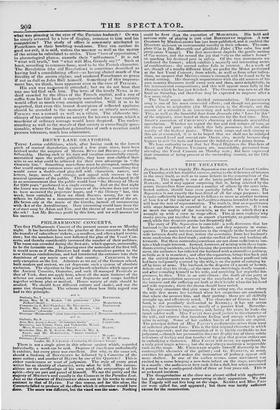THE THEATRES.
JOANNA BA ILLIE'S tragedy The Separation was acted at Covent Garden on Thursday,with but doubtful success, owing to the deficiency of interest in the story itself, as well as to some defects in the construction of the drama. This tragedy is one of the lately-published plays of Miss BAILLIE ; and it may appear surprising that it, being selected by the actors themselves from amongst a number of others by the same cele- brated author, should have even partially failed. To be sure, The Separation is not exactly the best-fitted of all for stage purposes : but it ranks sufficiently high amongst its fellows to serve as another instance of how few of the number of well-written dramas intended to be acted will bear the test of representation. The truth is, that an acquaintance with stage-business is essential to a dramatist's success. It is not so much the quality of the materials, as the way in which they are wrought up with a view to stage-effect. This at once explains why trashy pieces, put together by an expert playwright, so generally suc- ceed, while fine dramatic poems too frequently fail. The story of The Separation is soon told : a wife discovers that her husband is the murderer of her brother, and they separate in conse- quence. The main interest consists in the struggle in the breast of the wife between doubt and fear, before she ascertains from her husband's mute confession the fatal truth ; and the conflict of love and loathing af- terwards. But these contending emotions are not alone sufficient to sus- tain a high tragic interest. Instead, however, of mixing with these ingre- dients stirring incidents, and heightening the passion to a terrible denoue- ment, the authoress has infected the husband with a groundless jealousy, as futile as it is transient ; and after the separation, brings him back just at the critical moment when a braggart coxcomb, whose proffered suit had been indignantly scorned by the wife, is on the point of carrying he off by force of arms. The husband, in the disguise of a monk or hermit, defeats and slays his rival,—at time same time receiving:a deadly wound : and after revealing himself to his wife, and receiving her regretful for- giveness, he dies. This is an anti-climax : the death of one party at least is by prescription necessary to the conclusion of a tragedy, but the interest and the suffering are both at their height when the husband and wife separate ; there the drama should have ended.
The only situations that give scope for acting are, the scene where the wife first meets her husband when her suspicious are awakened, that where she accuses him, and their parting: these are all skilfully wrought up, and effectively acted. The charm ter of Garcio, the hus- band, is not peculiarly well-suited to KEMBLE ; it has not action enough : the emotions, too, are mostly of a passive kind. Neverthe- less, his personation is impressive; and, bating his years, he looks the rough soldier well. Miss Faucir does good justice to the character of the wife, and evinces that impulsive feeling and energy which gives value to acting.. Some of her sudden bursts of passion are capital. The principal defect of Miss Fauerr's performance arises from want of sufficient physical force. This is the first original character in which she has appeared ; and the conception of it is highly creditable to her judgment,—though her personation does not display any of those subtle inflexions of feeling and fine touches of by-piny that genius strikes out in embodying a character. Miss FAUCIT will never, we apprehend, be a truly great tragic actress ; but she may always maintain a respectable rank on the stage. Mr. PRITCHARD acquits himself discreetly in the contemptible character of the gallant ; and G. Br:Net:Tr, as usual, overdoes his part, and makes the insinuation of jealousy appear still more shallow. In one of the earlier scenes, some merriment was excited by a nurse bringing a new-horn infant on the stage, enveloped in a mantle the audience at first took it for a doll, but when uncovered it proved to be a curly-pated child of three or four years old. This is an awkward incident.
The disapprobation at the close was almost stifled with applauses ; but the malecontents were persevering in their opposition. We fear the Tragedy will not live long on the stage. KEMBLE and Miss FA CIT were called for, and appeared; but there was hardly sufficient excuse for the resurrection.


























 Previous page
Previous page